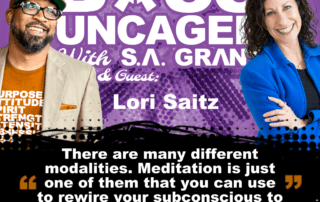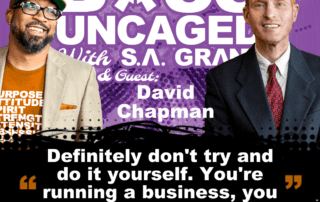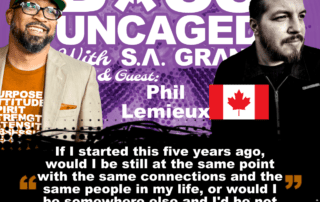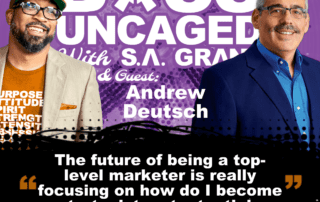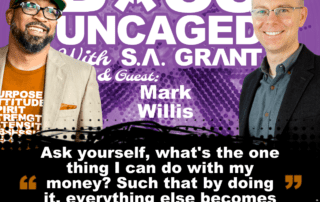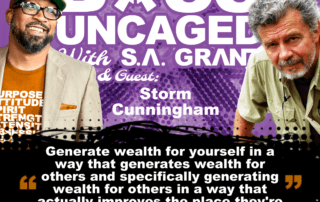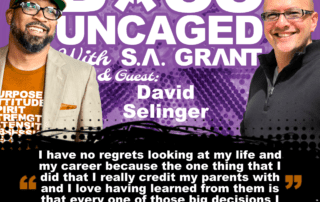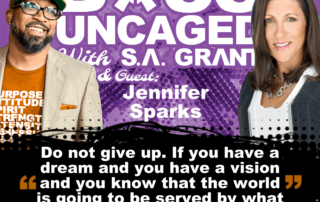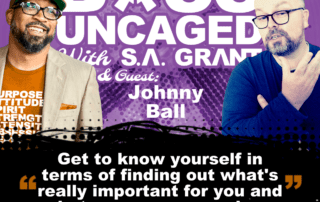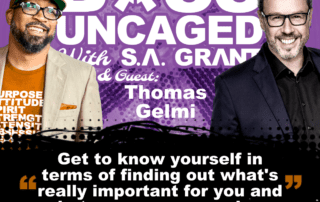CEO & Founder Of Zen Rabbit: Lori Saitz AKA The Zen Boss – S3E25 (#121)
Boss Uncaged Podcast Overview
- What can Zen Rabbit do for your business
- What is Lori’s morning routine
- What tools is Lori using in her business
- And So Much More!!!
Boss Uncaged Podcast Transcript
S3E25 Lori Saitz.m4a – powered by Happy Scribe
Three, two, one. Welcome back to Boss Uncaged Podcast. Today’s show is a special show because not every day I get to share the podcast with someone that I’m going to be sharing on stage. Right. So we both have speak engagements at the same time, at the same event, which is coming up in 71 days. And it’s going to be in Texas. So give you a little bit of background. Right. This particular group of people that are going to be speaking all of us are deemed to be badasses. And obviously the person that I’m talking to right now is obviously a hell of a badass. So I’m going to deem her the Zen boss for obvious reason. So why don’t you go ahead and tell our listeners a little bit more about who you are, Lori?
Sure. Well, let’s explain the reason for the Zen Boss part. My company is called zen rabbit ZenBoss perfectly fitting. What I do is and I create meditations that put people in a Zenful blissful state, customizing gratitude meditations and helping people just find and feel more gratitude, more joy, more contentment in their life, I don’t like to say find their purpose that seems so overwhelmingly giant and intimidating.
Interesting. Definitely interesting. So let’s just talk about the summit a little bit. I guess just back up those who have been listening to Pascals for a period of time. They’ve obviously heard me interview Donnie and Kevin Snow before. And Donnie is the founder of the Success Summit or the Badass Summit that’s coming up in Texas. So how did you even get associated with Donny to begin with?
I will answer that question. But first, I’m Super curious, what’s Donny’s nickname?
Donny’s nickname? I don’t remember. I think it’s funny because it’s like I give everyone a nickname while we’re talking. I’ll try to look it up, and then I’ll come back to the table with it. All right.
Well, Donnie and I were introduced by a mutual connection a year and a half ago, at least when he was doing his first podcast. And so she introduced me and I was a guest on Donny’s first podcast. He invited me into his Facebook group, Success Champions Facebook Group. I was in there for a while, and then it wasn’t until November of 2020 that I actually ended up joining one of the Success Champions networking groups, the Bethesda Badasses, in the Washington, DC, Metro, and working with Donny to get my podcast up and running and all that good. It just flowed from there.
Nice. So as a reminder name. I remember interviewing him and Kevin at the same time. So I deemed both of them badass bosses. So it was more of a plural thing. Right. Got you. So let’s talk about you a little bit more. Right. Obviously, you have your zen rabbit. You have a pretty cool podcast as well. Fine. Is a four letter word. So let’s talk about you as an individual. If you could define yourself in three to five words, what would those words be?
Disciplined, creative, inspirational.
Nice.So going off of inspirational, where did you find the inspiration for your podcast? And even playing with the word, playing being a four letter word, how did that come to fruition?
Yeah, well, I think a lot of people, when they’re creating their businesses, their ideal client is themselves five or ten years previous, because that’s certainly the case for me in that five years ago, I was my ideal client. I was stuck in this place where everything was fine, but it really wasn’t fine. There was this deep undercurrent of suck, and I didn’t know what to do about it. I actually did know I say I didn’t know what to do about it. I didn’t want to know because I didn’t want to admit what the answer was. But stuck in this place, and this is a lot of my clients are in their 40s and 50s, primarily women who are in this place going, all right, everything’s fine. Look at all of this. I have, like on paper or from the outside, looks like everything’s fine. And that’s where I was, too. And but everything was not fine. My business was not fine. My marriage was not fine. And what was I going to do about that? Because you can stay there. Fine is a perfectly comfortable place to be. It’s familiar, but your soul wants more. You need fulfillment and growth. And so that’s where I was. What actually happened was that in 2014, my mom passed away kind of suddenly after six to eight weeks after a diagnosis. And at the same time, I was shutting down my first business because I couldn’t scale it the way I wanted to. And it was really a time of reevaluation. Okay, again, do I want to live the next 20 years the same way I’ve lived the last 20? And what will I do differently? And so it took me a few years of being still stuck in that place before I said, all right, yeah, I did shut down the business, but now what am I going to do with this marriage? And I didn’t want to leave because this is somebody that I had been with. I’ve been with him more years than I hadn’t been, spent more of my life with him than without. And everything was fine. But the relationship wasn’t serving either one of us anymore. And I had to find the courage to leave for the benefit of both of us. Neither one of us wanted to be the one to make the first move because it’s scary and it’s hard. I had to do it. That’s why I had to jump.
I think obviously, anyone, whether it’s male or female, listening, right. I think many people have been down that path that you’re talking about and you’re describing so, I mean, just talk about that a little bit more. Right. Like, you have a brand that’s called “Zen Rabbit”, which is obviously like a play on multiple different things, and then you have this podcast. So bringing them together, how did that help you kind of escape, like going into the Boss Uncaged brand? How did that help you break out of the cage that you were in and evolve you to the person that you are right now?
Well, leaving my marriage gave me the I don’t want to say it gave me a freedom, I guess, to break out of that. I don’t like thinking of that marriage as a cage, but I guess in the way it was. Yeah. So it allowed me to grow into who I have become today, and I don’t want to just grow again. You outgrow a cage. So I don’t even have dogs. I don’t know why this came to mind, but when you get a puppy and your cage training, they sleep in the cage, and then they get bigger. They might need a bigger cage or they need to learn how to sleep without the cage. Whatever, you just outgrow it. And I guess that’s what happened. And now I have been able to kind of blossom into what I’m doing now. I don’t think fine is a four letter word would have come to being if I had stayed.
Wow. So let’s step into the space as an individual that you’re helping. Right. Because obviously you walk the walk, you’re talking to talk. You broke out, and now you’re living by the example that you’re preaching. So what does your company actually do? How do you actually help someone on that journey?
Yeah. So again, the Gen X women, those who are in their 40s and 50s, stuck in this place. So the way I help them is a couple of ways. One is accountability, like holding them accountable. But listening to them, first of all, listening because they have a story they want to tell it somebody. They need somebody to listen to them. And my job is not to tell them what to do. It’s to ask them questions, to help them reach their own conclusions about what to do. And it’s not always just about a marriage. It could be a job, it could be health, it could be any situation where they feel stuck, that’s fine. So helping them find gratitude. One find gratitude for everything that they do have. A lot of times it’s hard to see what you have. You only see what you don’t have or what you want. So let’s start at gratitude, because if you can’t be grateful for what you already have, how can you be grateful for more and then recognizing the connections that people have? What are the connections you have with your friends, your family, your partner, your community, and then most importantly, yourself? And that’s where the meditation part comes in that I talk about. And then the third piece is courage, helping them find the courage holding their hand as I push them off the cliff. And those three pieces are what make up the trilogy for success within my find a fantastic program, and I’ll be talking more about that at the Badass Business.
Nice. Very interesting. So I love branding, and I love the title of your company “Zen Rabbit”. So I’m going to ask you, how did you come up with that name? I mean, obviously, you’re talking about journeys. You’re talking about helping people become more who they are. You’re influencing them. And like you said, you’re pushing them off the cliff. Where does the rabbit fit in? Are you running out the hole? Are you running around the tree? Are you Alice in Wonderland? Tell us a little bit more about that.
Yeah, we can come up with whatever story we want for that. Actually, Zen Rabbit was the name of my first company, the one that I had to shut down. It was called Zen Rabbit Baking Company. At that point, I was manufacturing and distributing a product called the gratitude Cookie. So, see, it all ties back to the gratitude thing, but gratitude cookies were marketed as a way for business people to say thank you to their clients and to the people who sent them referrals. Zen Rabbit. I did such a great job of branding. Everybody associated the name Zen Rabbit with me. So when I started my next company, I started out with a different name, but I ended up coming back to Zen Rabbit because everyone still associated me with the name Zen Rabbit. So they didn’t maybe didn’t remember my name, but they remembered Zen Rabbit. So I jokingly call this Zen Rabbit 2.0.
Nice.
But even so, I’m still helping people find that place of Zen calm. Whatever’s going on, whatever chaos is going on around you, if you can stand in your own power and find that place of Zen.
Then, well, with the story behind something. Right. So understanding like that was within I don’t know how much time has passed since that company to. Now let’s go back even further. Right. What were you like as a kid? Were you like that kid that was always giving gratitude or that’s something that you grew into over a period of time?
Yeah, there’s a whole story there, too. So as a kid, I was super shy. I was the one who would sit unless somebody called on me. I wasn’t the one jumping out of my chair to give the answer to the teacher.So shy. All right, so since you asked, I’ll tell you that the name Zen Rabbit actually goes back to when I was baby in the crib because I had a stuffed rabbit that my mom had put in the crib when I was three months old and realized that if she took that stuffed animal, that rabbit out of the crib, I wasn’t sleeping. So she made sure the rabbit was always in the crib. And as I got older, I would rub her ears for comfort. You know, how little kids have their blankets or whatever. I would rub her ears, and that would put me in this Zen meditative state. There are pictures. So she was my Zen rabbit, even though I didn’t call her that at the time, taking it all the way back to the crib. That’s really where the Zen Rabbit started. And so in terms of feeling gratitude, no, I was not even when I first started Zen Rabbit baking company and was selling gratitude cookies. That’s the irony. I wasn’t a very grateful person. And it was a mentor who kind of gave me an exercise to do, who saw that I was not grateful and said, you need to work on this. And he gave me a 30 day exercise, and that helped me see and feel and become more grateful on a regular basis. So I alw0ays say, even if you are not naturally born a grateful person, you can become one.
Well, that’s very interesting because obviously, again, you’re walking the walk, you’re talking to talk. So now that you’re in front of people that you’re helping them, you’re probably faced with the mirror from time to time. You’re probably faced with someone that was you ten years ago. That was just 15 years ago. So what is the worst scenario you’ve been in? Being face to face with that mirror of yourself and being in front of you, and you’re encountering someone that may be a little bit more difficult, a little bit ungrateful. What is the worst example of that have you been experienced so far?
The worst example of somebody who’s been ungrateful and you’re trying to help gratitude?
Yeah. You’re looking at them feeling like, well, you remind me of me 20 years ago, ten years ago. And it kind of hits that switch for you to kind of do a flashback, but at the same time, they’re being difficult.
Yeah. Well, and again, I will challenge them the same way I was challenged, not necessarily giving them the same exercise, but there are other exercises that I’ve found work and give to them. So this is interesting that you’re asking me this question because just this past weekend, I was having a conversation with someone who was struggling with this. Well, I do a gratitude meditation every morning, and it’s still not happening for me. And this is breaking and that’s going wrong. Okay, step back. Here’s what I recommended you do. Find the gratitude, even in the things that don’t seem like there’s something that you would be grateful for, that you’re frustrated about the challenge. And the game is find the gratitude anyway. Find one shred one small little piece of gratitude or some small place where you can see gratitude.
Interesting.
I was going to say you could even take it to the crazy extreme of, well, at least this didn’t happen. All of this crazy stuff. Well, at least this didn’t happen.
Very interesting. Just listen to you speak. And I mean, obviously stemming from the topic of gratitude and going back in time, and you had gratitude cookies, and that was a business, and you kept the same brand, but you’ve rebranded the structure of the business, which is now it’s ironic because you were giving gratitude, but you really are giving gratitude now in a different format. Right. So how is your business structure? Because, I mean, obviously, I think before you were talking about solid products and now you’re talking more so about, like, Mindset services. So are you LLC,S corp C Corp? Like, what flavor are you?
I am an LLC corp.
Got it. Is there a particular reason why you set it up that way?
That’s how my accountant recommended. So I just said, okay, I trust your expertise.
Nice. Very nice. So going to just talking about just general hurdles, and I think you kind of overcame some hurdles, but let’s dive into more. So, like, how do you deal with hurdles now that you have gratitude in place? So when hurdles are presented to you and for your clients, when hurdles are presented to them, how are you teaching them to overcome these hurdles?
Meditation has been such a big key piece for me because that is what keeps me I think that, first of all, meditation rewires your brain. So that’s an actual biological thing that happens. And when you can rewire your brain, you can stay grounded and calm regardless of what’s going on around you. And it makes it easier then to find the gratitude. The two kind of go hand in hand. If you can become more grateful, you can maybe are more likely to meditate. And if you meditate, then you’re more likely to be able to find gratitude in challenging situations. So that meditation piece for me is key in helping me stay look at challenges like, okay, all right, this sucks. And I’m going to figure it out, or I’m going to find people who can help me figure it out because that’s another thing. You don’t have to know everything yourself. Do you know who can help you? Great. That’s even better. So always coming from this place of, okay, all right, this sucks. And that’s not having. So I want to make a point that does not mean that you don’t feel emotions, that you’re not sad or angry, but you feel the emotions, and then you move past it.
Wow. I’m just thinking and recapping what you said. I love when these moments happen, when I’m actually having interviews where I have to pause for a minute, stop rewinding my head and listen to what you said. So, I mean, would that leads me to another really in depth question. Right. So for an average listener listening to this and they’re saying, okay, you’re telling me that I need to meditate and I need to get into my Zen state. I need to have a powerful state of mind and have my set all these different things. And they’ve been doing it for a period of time. And for them, you’re doing it is kind of like an overnight success to them. But in reality, how long have you been on your journey to get to where you are currently?
Yeah. Okay. So I learned how to meditate when I was ten. My mom took my brother and me to a meditation course, and so I had that as a foundational piece of my background. But I did not use it. I probably used it from when I was ten to eleven, and then I forgot about it and didn’t use it. And I would go back to I know meditation is good for me, but I didn’t do it. And I might come back to it during a particularly challenging period of time or something and do it for a week, and then five years would go by and I wouldn’t do it again. And then I’d recommend it to other people. Hey, you should try meditation. And I still wouldn’t do it myself. 30 years. Wait, probably from 1035 years, maybe 30, 10 to 45. Yeah, something like that. Until around again. The same the passing of my mom and I read a couple I started reading some books, and I found a particular meditation that resonated with me that for some reason it was like the perfect storm, I guess, of finding that meditation and being ready to make this a consistent, regular practice.
Wow.
And so now it’s been I want to say probably about four years, four and a half years that I meditate every day in the morning before I get started in my day. And once you get now the point that I am at now and only like ten minutes, I’m not spending an hour, which is another misconception. People think I got to spend hours now, just ten minutes. Now if I don’t do it in the morning and as a way to set my day, it almost feels like I didn’t brush my teeth, like leaving the house without brushing your teeth. Something feels off.
Just thinking about that. Right. So meditation is part of who you are as part of your essence. Right. So let’s say if you can kind of go into, like, a state of meditation and you get so engulfed in that state of meditation, you could have out of body experience and you’re riding the silver lining. And somehow, some way through this metamorphosis, you could time travel back into a younger version of yourself just for a couple of minutes, what would you say to yourself in that time frame at any given time? For a few minutes that would change the outcome of where you are currently?
I guess if I had started practicing meditation earlier, life would have been easier. I am guessing it would have been easier because, again, I would have just been coming from a more grounded place instead of spending so much time in worry and anxiety about how life was unfolding.
I can see that. Right. It kind of goes to you’re seeing the benefits of what you’re doing now, and then you kind of want to think about what if I did it just a little bit earlier? If I did it five years before, where would my compounding effect be today? Definitely. Very interesting.
Well, and I seriously wonder where that first business would have been if I had been meditating and visualizing, because to me, those pieces go hand in hand. How much more successful could that business have been?
I think it brings up a very solid debate. Right. I think everything happens for a reason. Right.
I agree.
I definitely believe with that. So I think the work that you’re probably doing now could easily then recreate those cookies on a whole other spectrum that you never would have gotten to until you are where you are right now.
That is true. Right. We’re speculating. What would I have done? And at the same time, I completely believe that everything happens the way it happens for a reason. I would not necessarily be where I am now if things hadn’t unrolled the way they did.
Yeah. Probably wouldn’t have a podcast as well.
Oh, my gosh. Yeah.
Think about that.
My podcast is the thing I’m most excited about right now. So, yes, that would be horrible.
I’m loving this conversation with the whole time traveling thing. So let’s just go back and think about it for a minute. So you’re talking about your parents introduce you into meditation. Right. But you obviously have entrepreneurial hustle. You have entrepreneurial insight. You understand business, you understand strategy. When did that come into play? Was that like one of your parents, an aunt and uncle? When was the first time you were introduced into that space?
This is interesting because you’re giving me a different perspective. So my mom is the one who introduced me to meditation. She also encouraged my dad to go to that course, which he did, but he did not buy into it at all. I think he was just placating her, and then they ended up getting divorced a few years later. So anyway, not because I’m sure not because of that. But my dad is the one who introduced me to entrepreneurship because he always had a side hustle, which wasn’t called that back then, but he always had something. And then for several years of my childhood, he ran his own business. He owned an independent hardware store before the days of Home Depot and Lowes. And even after he sold that business and went back to being an employee for somebody else, he still always had a side hustle. He’s 80 years old. He’s retired, but he still has this business on the side that makes a couple of extra Bucks for vacations or whatever.
Nice.
Yeah.
So obviously thinking about it in retrospect, you got your hustle from your dash. Yeah, pretty cool. Pretty cool. So you’re talking about just general hustle. And obviously you kind of had two sides of the coin growing up. How do you currently juggle your work life with your family life?
I don’t have a family life. Alright. So S.A, I don’t have any kids, so I don’t have the necessity, I guess. You know what I’m saying. I know people who have kids, they have to spend time with them. I don’t have that. So to me it’s almost all work. Okay, so let’s say I’ll reframe. It my business and personal and I don’t believe in work life balance because I think it’s a flow between all of those things. And when you’re entrepreneur, you’re always thinking about work and that’s not necessarily a bad thing. It’s just always there. You’re always looking for ideas and open to discussing it just because it’s fun. That’s fun. And so for me, it’s hanging out with friends and working in the business during the hours that I’m working and then hanging out with friends and going to do hiking or I don’t even know what else we do. We sit around a fire pit and chat and laugh.
Nice. You definitely have some balances in there. But to your point, as entrepreneurs, if we hear about some new software or a new strategy, that’s like drinking a beer and hanging out with our friends for us. So I definitely understand that firsthand. So going into I think earlier on you were talking a little bit about your routines to a certain extent. And I would think probably one of your routines or your morning habits would be meditation. So let’s talk about what is your regimen on a daily basis? What are your morning routines?
Yeah. So getting up and waking up and doing a meditation straight away before anything else can get in the way. I know plenty of people who check their phone right away as soon as they open their eyes. I don’t do that. The meditation app I use is on my phone, but I go straight to that, open it, do a meditation, and then get up. And while I’m doing my morning stuff, taking a shower, brushing my teeth, whatever, a lot of times I’ll listen to a podcast and then some days, not every day, I will also listen to Carrie Underwood’s song Champion because that gets me charged up. And then I will get into my work day, depending on what day it is. If I’m writing a meditation, which I do once a week, I don’t even open my email before I go to do that.
Interesting. Again, I think you’re walking a walk. You’re talking to walk, right? So in that I think just as we’ve known each other and we’ve had conversations here and there and being in the same networking group as well, and being able to talk on the same stage. I would definitely say that you’re an app student of whatever principle it is that you’re studying and you’re diving into much like how you’ve picked up podcasting recently. So my next question is a three part question. Right.
Okay.
On your journey before where you are right now, what books or audio books have you read to kind of help you and inspire you to get you to where you are? Part two of that question is what books are you reading right now or audio books are you listening to right now? And part three is, have you had an opportunity to author or write any books to date?
I prefer to read a book than to listen to a book. And the books that have influenced so many. I mean, I’m always reading. I’m a huge proponent for literacy. I’ve been a literacy tutor, adult literacy tutor, because reading is so important. So one couple of them that come to mind right off the top of my head. So “Infinite Possibilities” by Mike Dooley. It’s not a business book. It’s about the infinite possibilities of what you can create manifest. However you want to say it, that one’s been a big one. I’m sure plenty of people have mentioned on your podcast “The Thinking Grow Rich”. However, Napoleon Hill wrote another book that actually was not published during his lifetime called now it just skipped out of my mind. “Outwitting the devil”.
Oh, yeah. Storytelling of that one is marvelous.
I just read that one this year, and it is astounding to me how relevant it is today when it was written in 19, what a 40 something somewhere around there? 38, 40. Yeah. Like crazy. So a lot to take out of that book about letting fear rule your life or not. That one’s been tremendous. It’s just so many business, business book
it’s so funny for our listeners that are listening right now. Every time I ask this question and every time someone turns off camera so you can’t see them, that’s when I always get that smirk on my face because they’re looking at some massive library off camera somewhere.
That is right. You are so right. That’s exactly it. Yes. Robert Cialdini’s book persuasion. That one’s tough for me to get through. It’s fascinating to me because it’s about marketing and my background. Professional background is really marketing. I love talking about marketing. That one to me is fascinating. But I haven’t worked my way through the whole thing yet. It’s taken me quite a while. So that one is still on the top of the pile of something I am reading to the second part of your question. Yeah. Dan Kennedy. I’ve got like a whole bunch of Dan Kennedy books in terms of marketing. Yeah.
Let’s move to the third question. Have you had an opportunity to create any books of your own yet?
I keep getting asked that question. So I hear you, universe. I hear you. I had written an ebook on networking because that was in between that Zen Rabbit baking company and what I’m doing now. I was teaching networking strategies how to feel comfortable walking into a room full of people where you don’t know anyone, especially when you’re what I call the quiet person, somebody who is not super comfortable in those kinds of situations. So I had written an ebook on that topic. But there is a book coming. It’s like Percolating in my head that will be called “Fine as a four letter word”.
Nice. So it’s definitely interesting that you brought that up because that’s one of the things that I was coaching. Any podcast that I’m working with is kind of like if you have a podcast, you should then think about creating a book that represents that podcast to a certain extent, or at least the principles or at least mimicking some of the interviews. So what is your style of your book that you’re going to release in parallel to your podcast?
What I’ve been advised as far as the easiest way to write a book is to just take the presentation, for example, or that I’m doing at that business summit, which is also called Fine is a four letter word. Taking that presentation or taking the Fine to fantastic program that I have and creating a book out of that. Twelve weeks. The process of that. Twelve weeks. That’s great. That definitely would be an interesting and valuable book. Personally, though, I like books that are stories about people’s lives. Richard Branson’s books that I’ve read. What was his book called? I mean, he’s got a couple of them. Something about losing my virginity, it is called. And any of the business leaders who write books about their personal story that to me I want something like that. That’s interesting. And then interwoven maybe some pieces about how to me that’s more challenging, though, to write a book that is really diving into your life. It’s more vulnerable. And maybe that’s why it’s more challenging and just coming up with the memories, too.
It is more challenging. So to add a little twist to that. Right. And this is the reason why I have not released my Boss Uncaged book, because I already had the book written. We were getting ready to release it in January. And I was like, okay, let’s go on back to the drawing table and make modifications. So what I decided to do was take every single interview that I did in my first season and take those stories, optimize those stories, and then lead those stories into a self help moment or a definition of a particular word or understanding a particular philosophy, and then collaborate all those into one book for season one. And then it allows me to then create multiple books for every season using the same exact format. Love it with that. Obviously, I think you’ve been on a hell of a journey, right? You’re talking about meditation. You’re talking about your marketing background. And it’s ironic that you brought up outwitting the devil, because who hasn’t read that book yet? Let me give you a little clue to that book, right? It’s such a phenomenal storytelling book. It’s imagine you sitting down facing your worst enemy, which in this case is the devil, but it’s really yourself and you’re hearing your own overtones and you’re arguing with yourself and you’re perceiving it as the devil talking back to you, but it’s really yourself holding you back. So my next question to you is like, you’ve already kind of surpassed that to a certain extent. And that devil may come knocking from time to time, but where do you see yourself 20 years from right now?
I see myself as somebody who is I’m not going to say a household name, because that’s not what I’m looking for. Not Lebron James famous, but one of my good friends used to call Church famous. So he worked his business was in helping pastors build their communities, build their Church communities. And so there were a lot of people in that world that were famous within that world. And I mentioned Dan Kennedy earlier. So Dan Kennedy, a lot of people who aren’t in the marketing world don’t know who Dan Kennedy or Frank Kern are. So they’re Church famous because they have their famous within their own community, their own world, but they can still walk down the street and nobody knows who they are.
Very true.
So that’s what I’m looking for. Church famous.
I can see that.
Okay. But not just for the theme. It’s for the community that I want to build that will support and encourage each other.
Nice.
I want to be the conduit for that.
Well, I think you sprinkle a little badass on that. You brought up Frank. So people that don’t know Frank. I mean, Frank is the type of person that will walk across the stage amongst 5000 people with a glass of whiskey in his hand and just be like, what am I going to talk about today is probably going to offend some of you, but at the end of it, you’re going to understand how to monetize and make money. So I could definitely see that, right? I can definitely see that completely. So, I mean, just talk about your marketing side for a bit. I mean, we’re talking about the Zen, we’re talking about the Feng Shui. But I see all the things that you’ve been working on behind the scenes and moving the pieces. You’re a marketer at heart. Yes, most definitely.
For sure.
How does that work for you? As far as even branding with the Zen Rabbit, how did you take these elements behind the scenes and then bring them forward into meditation?
I don’t know that the two are necessarily related because I’m branding my brand of meditation. The podcast is one of the ways that I use it as a marketing tool. Everything’s a marketing tool. Participating, engaging, posting on LinkedIn, Instagram, Facebook, whatever. Creating content, creating videos like this, creating written things, creating ebooks or video like everything is content. Everything is marketing. Building launch teams to help share the word about what I’m doing now or the testimonials and asking people to share and refer other people to the podcast. I don’t even know how I do this essay. Marketing. It’s not a mysterious thing, but I think some of us are just innately born with disability, just like some people are great with numbers. Okay, you do not want me doing your bookkeeping. That’s not my thing. But marketing, that’s my thing.
Nice. So just talk about what applications that you currently use that you would not be able to do what you’re doing without. Obviously, you have marketing tools, you have onboarding tools, CRMs, and so forth. Name a couple that you’re using right now that you wouldn’t be able to do what you’re doing without.
Riverside. fm is what I use to record my podcast. I love that tool Camtasia I use to edit video Canva to create graphics. What other good tools do I use? Those are the most prominent ones that come to mind.
Preety effective tools alright so, i have been keep thinking about like outwitting devil and the time traveling reference that we made earlier. So let’s say I am a 25 year old, maybe 35 year old female, right. And I have the devil on this one side, and they’re telling me to do things, and I’m arguing and debating with them. Right. And then you have the opportunity to be the words of insight, the words of wisdom. You get to be the angel on the other side, and you get to whisper in that person’s ear, what words of wisdom would you tell that person to not only ignore the devil, but to also progress them, to move them forward.
One of the things that we didn’t cover in our conversation today is getting into your subconscious. Because all of your behaviors and your actions come from what has been programmed into your subconscious mind, 95% of what drives you is in the subconscious. So if you have this devil on the one hand telling you you can’t do it, you suck. You’re never going to make it, you’re never going to be successful, you can’t make money, and you just put an angel on this side to fight it out in the conscious mind, it’s not going to work. Which is why I come back to there are many different modalities. Meditation is just one of them that you can use to rewire your subconscious to make that devil get smaller.
Nice.
That’s how I would do it.
Nice. So just talk about your target demographic, right? Obviously, I think we alluded to it a little bit, but let’s really get into, like, the psyche and the actual avatar. If I was a person who would I be to be your best client?
You would be a 45 to 55 year old woman who has kids who are graduating from high school and going away to College or graduating College. Either way, they’re moving out of the house. And this is the time of transition where you are wondering, okay, I’ve raised my children. Now what my focus? Even if they had a professional career outside of the home, so much of my time and energy has gone into being a parent, and now they don’t need me in the same way anymore. Now what what is my purpose now? How do I rediscover my purpose or recreate who I am?
Very interesting. I would think, like, obviously, we’re both marketers. So just understanding, like the six degrees of separation. I would think ideally, if you’re not targeting that individual, you’re probably talking to a lot of real estate agents that know a lot of those people.
I’m actually not talking to any real estate agents.
Think about it. From that standpoint. Right. Think about it. Real estate agents are golden nugget because you’re talking about people that are downsizing.
They may be, although I think the downsizing doesn’t come until a few years later because a lot of people don’t necessarily move out the second the child goes to College.
Yeah. I think it’s two sides of that coin because, I mean, like, in the neighborhood that we live in, the second kids graduate from high school, in this neighborhood, these houses go for sale left and right because they’re like, okay, kids are gone, they’re going to College, and now we’re going to downsize to something smaller. Are we going to go move and live on a boat or whatever it is so that they’re willing to move on the second those kids get that diploma?
Yeah. You’re giving me something to think about, though, because if they’re stuck in that place where everything’s fine in the marriage and the kids leave and now they’re like, they’re looking at each other going, I don’t need to stay with you anymore, they’re going to sell the house.
Yeah. And the real estate agents, they know this. They know these people.
They do. The challenge is that a lot of times people don’t talk about these things except to their closest friends. And even then, sometimes they don’t.
Nice.
Yeah.
So we’re talking to someone that’s 45 right now listening to this podcast. How do they get in contact with you?
They can reach me through my website is zenrabbit.com. Pretty simple. We’re broadcasting live on all the socials so Instagram zen_rabbit, LinkedIn, Lori sites, zenrabbit Facebook page. zenrabbit, again, fine as a four letter word is on all the podcast platforms. So wherever you listen to a podcast, go Find as a four letter word.
Nice. So going into bonus round. Right. I mean, you’re leaving off with that last statement about your podcast. And so my question is going to be, what is your most significant achievement to date. This is where the Jeopardy music comes in.
Yes. Let’s play that. Most significant achievement. I think it is really as crazy as it’s going to sound is that launching of the podcast because it’s something that I have actually wanted to do for years. So I mentioned I have a background in marketing. I also have a background in broadcast. And this is a combination of all the things that light me up and bring me joy, the creation of the podcast and the honor of being able to bring other people’s stories out into the world.
Nice. I kind of set you up for that one. I knew that was coming. Right?
Yes, I do.
Going into the podcast a little bit more. Right. So is your ideal customer also your ideal interviewee?
My ideal interviewee is maybe a couple of steps ahead of my ideal client because the people I’m talking to on the podcast have stepped off of fine. They may not be all the way to fantastic yet, but they have taken that leap or they’ve been pushed off of fine. And so the conversation is around, how did you get stuck at fine and then what did you do to move off of it? What were the tools that you had to find and use to not lose your mind when you did that?
Yes.
And how is that journey gone so far? So not everybody has gone. Even the people I’m talking to on the podcast, they’ve stepped off a fine. Some of them have gotten to what they would call fantastic. Some of them are still on the journey.
I have another bonus question for you.You got to man.
As a marketer again. Right. And this bonus and that bonus and you also get.But wait, there’s more.
For 25% off. Yes. So if you could spend 24 hours in one day. Right. With anyone dead or alive uninterrupted for those 24 hours, who would it be and why?
Katie Crook.
I did not see that shit coming. I’m listening. I want to hear why on this one.
Everyone who knows me really well knows I have this thing for Katie Crook. So Katie and I share the same birthday, not the same year, but the same day. And I have just always been enamored with her, look to her as a role model, because I mentioned having a broadcast background and when she was on the Today Show was doing the thing that I wanted to be doing in large part and then the rest of her career, because she certainly had a successful career since the Today show. She’s taken chances. She had to prove herself all the way through her career. And she’s done things that probably were terrified her and she did them anyway. Stepped through the fear, did it like hosting CBS News Nightly News or whatever it’s called. People said she wasn’t going to be successful at that and she did it anyway. And she just continues to reinvent and reinvent. And I just feel like she would be a really cool person to hang out with and get to know because I admire her professional accomplishments and the fact and I don’t have any children of my own again. But the way she raised her, seemingly from what I can see from the outside, and she did it all on her own because she was a single mom.
You got to talk into her either. I mean, obviously, I could totally see her being a guest on your show sooner than later.
Could you? If anybody is listening or watching this and they have a Katy Current connection, I am open to it.
Yeah. Talking into the either people speak it up. So going into closing, man, I love when I get to a chance to interview podcasters, because this is the part of my episodes where I give you the microphone and you become the host and you get to ask me any question that may have come up during this episode.
Ask you a question about what came up during this episode. Okay, so the question that I asked my guest, tell me about the time when something in your life was fine. It was fine. It’s fine.
Oh, that’s easy. When I was in College getting my graphic design degree, things were fine, but it really wasn’t fine. I was searching for so much more and I just didn’t know how to get more at the time.
Did you not know how to get it because you were listening to outside voices that were telling you this is the path you should be on?
Well, no, I mean, coming from high school, because literally my senior in high school, I missed about like 90 days in my senior high school, I couldn’t completely hate the school, couldn’t stand school. Only reason why I even graduated from high school is because the teachers are trying to get rid of me. And they gave me opportunity to pass all my final exams. So my parents were like, you had a graffiti background with throw you in our school. And that’s when I kind of fell in love with, wow, I could actually do this for a living. But then my other side, the brain kicked in and it was like, okay, if this is here, then what else is out there Besides this? it was good to me it was great. But it was such a small aspect of the world that I knew that it was more, but I didn’t really know how to grasp more or reach for more or even what a coach was at that point in time.
Yeah. I think a lot of us are like that at that point because we just haven’t had enough life experience yet to know where to go or what to look for.
Yes. And to your point, I think your title of your podcast, it really defines that because looking back at it. I was fine, but it wasn’t fantastic, right? It was like, what else can I do to make my life greater than what it was at that point in time? And I think now what I have now is kind of fantastic in comparison to where I was before and what I’m going to be doing moving forward. Definitely.
Yeah.
Any other questions?
That’s what I got for you.
Cool. Well, I mean, with that I definitely appreciate you taking time out of your busy schedule to be on the show. I think we definitely had a roller coaster of past and present versions of Lori. So I definitely commend you for everything that you’re doing and you’re going to continue to do as well.
Thank you for having out of the essay.
Great SA, Grant. Over and out.

